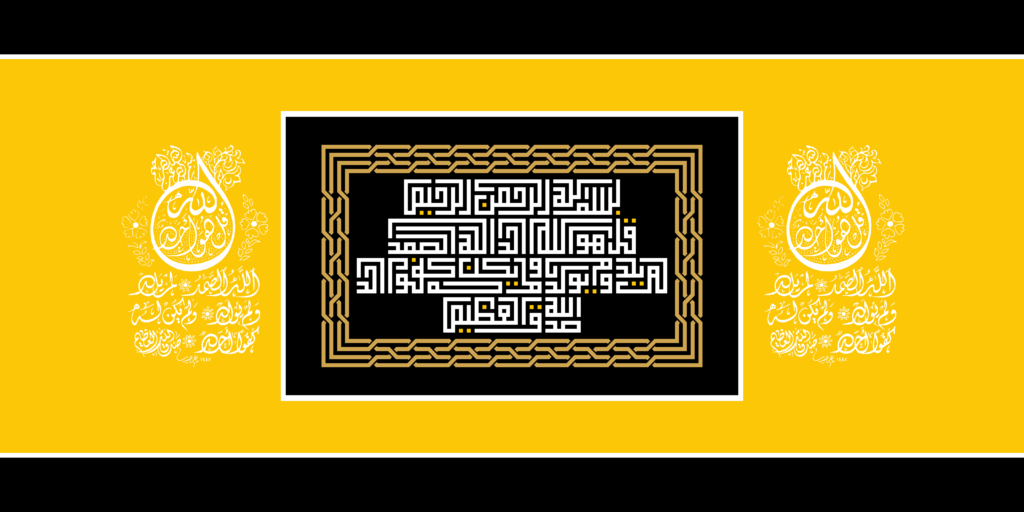Tafsīr of Sūrah al-Ikhlāṣ: A Reflection on Marriage
By Shaykh Mohammad Amin Kholwadia, President of Darul Qasim College
﷽
ٱللَّٰهُمَّ صَلِّ عَلَىٰ مُحَمَّدٍ وَعَلَىٰ آلِ مُحَمَّدٍ
Sūrah al-Ikhlāṣ is one of the most recited and memorized sūrahs of the Qur’an. It is often learned at a young age and its tafsīr regarding the absolute Oneness of Allah is used as a foundational principle of ʿaqīdah or creed in Islam. Even in the traditional texts of tafsīr, the focus of this sūrah centers around the Uniqueness of Allah, who is Incomparable in every respect.
But there is another approach to tafsīr that one can apply to this sūrah, an approach that exposes the creation in light of the Creator and, in doing so, the creation’s nature and dependency. This is to take the words describing Allah and invert them to see and know His creation through the opposites.
Before doing so, it is worth reflecting on the circumstances leading to the sūrah’s revelation. The Jews and polytheists had asked the Prophet ﷺ about the lineage of Allah. In response to this question, the Sūrat was revealed. It is fascinating that the question prompting the revelation of the Sūrat was about lineage—something vital for humanity, but irrelevant for the Creator.
If we read Sūrah al-Ikhlāṣ and invert it to the creation, we will see that it is all about marriage, human dependence, conception, and compatibility. The emphatic lesson in Sūrah al-Ikhlāṣ is this: We are not like Allah. So if we are not like Allah, then who are we? We are the exact opposite of Allah—our Creator, our Maker. There can be no contrast or comparison between Allah and His makhlūq (creation), especially human beings. Human beings are not alone. We are dependent upon another person and we conceive children, which is what marriage entails.
The product of Sūrah al-Ikhlāṣ in human society is the institution of nikāḥ. In marriage, we depend on our spouse, develop compatibility and have children—the exact opposite of who Allah is. This is the sum of understanding “theism.” Theism is the study of Allah, the study of God, or Theos. If we invert this paradigm and apply it to human beings, then we will need to eat the humble pie and say, “I need to be compatible with someone. I need to depend on someone. Because I am not God.” It teaches us humility. It teaches us that we are in need of Allah’s Faḍl. But more than that, it teaches us that in society, we need each other. Consider that when we die, we need at least four people to lower us into our graves. How can we be arrogant and think we are independent of people? We can’t even bury ourselves, let alone perform the rites of ghusl, kafan, and everything else. How can we live by ourselves if we cannot even die by ourselves?
One can see the human need for marriage in Sūrah al-Ikhlāṣ. Allah says He is Aḥad, the opposite of kathrah, or plenty. The creation is plentiful, whereas Allah is One. Allah is al-Ṣamad, totally independent, with no need for a companion. Human beings, on the other hand, are completely dependent on that which is other than themselves. Allah neither conceives nor was He conceived, unlike human beings. There is no one comparable to Allah, whereas all human beings share some comparability and likeness to others. Mistakenly, some human beings delude themselves into believing they are superior and behaving standoffish, displaying their selfishness and claiming, “I’m not compatible. I stand alone.” However, the truth of the matter is that human beings tend to be drawn to others who are similar to them in terms of personality, values, interests or other characteristics, whereas Allah is dissimilar, and nothing is like Him.
The Prophet ﷺ exemplified this sūrah by being the total ʿabd of Allah, showing his ﷺ need to be involved with other human beings. The Prophet’s ﷺ marriage to not one, but seven women, is a testimony to the fact that human perfection is in realizing the need to be with other human beings—particularly in marriage. Thus, we see the manifestation of his dictum, “Al-nikāḥ min sunnatī.” In essence, the Prophet ﷺ is saying, “Nikāḥ is from my sunnah because I am the greatest servant of Allah. I am Allah’s perfect ʿabd, (and out of perfect adab) I serve Him, and as I serve Him, I recognize that I am dependent on Allah’s makhlūq. I am incomparable to God the Almighty.” The proof of humanity and divinity is that the Divine remains divine, and the human remains human.
In this sense, the question about lineage comes full circle. Marriage is the institution whereby lineage is preserved and protected in Islam, and is a human civilizational value whose unmooring in modern society has led to many trials and tribulations. Looking back at the context of the sūrah’s revelation, the disbelievers’ question about Allah’s lineage revealed a fundamental lack of understanding about who Allah is. Likewise, much of our contemporary intellectual confusion is rooted in a fundamental theological misunderstanding regarding basic truths about Allah. This, in turn, has yielded in people a fundamental misunderstanding about what it means to be a human. The result is widespread existential dread, identity crises, anti-social communities, and erosion of the familial structure. Our hope in offering this tafsīr of Sūrah al-Ikhlāṣ is that we restore the understanding of the Creator vis-à-vis His creation, and our need for Him, so that we may seek Him in harmony with each other.

